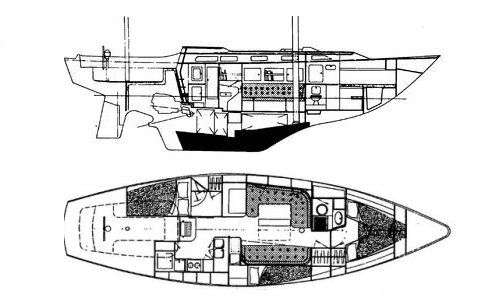The Nicholson 40 AC is a distinguished sailing yacht that embodies the enduring legacy of Camper & Nicholsons, a builder renowned for its commitment to excellence in naval architecture and craftsmanship. Designed in-house by the esteemed British shipyard, this 40-foot ketch-rigged vessel was conceived as a robust and elegant offshore cruiser. With its classic lines, solid construction, and reputation as a capable blue-water performer, the Nicholson 40 AC continues to appeal to sailing enthusiasts seeking a yacht built to withstand demanding conditions while offering comfortable liveability.
Nicholson 40 AC Information, Review, Specs

- Make
- Nicholson
- Model
- 40 AC
- Number Built
- 20
- Production Year(s)
- 1978 - ??
History and Design Ethos
Production of the Nicholson 40 AC commenced in 1978. True to the Camper & Nicholsons philosophy, which centered on achieving design and build excellence, effortless performance, and safe and swift cruising experiences, only 20 units of this model were ever constructed, with production extending into the mid-1980s, with some examples built as late as 1986. The "AC" designation signifies "Aft Cockpit," distinguishing it from its sibling, the Nicholson 40 DS (Deck Saloon), which shared the same hull design but featured a different deck configuration. This limited production run and bespoke attention to detail reflect the shipyard's commitment to quality over quantity during an era of significant transition in yacht building.
Sailing Performance and Handling
The Nicholson 40 AC, with its length overall of 40 feet and a waterline length of 30.5 feet, is characterized by its substantial displacement of 24,416 pounds. This heavy displacement, reflected in a displacement-to-length ratio of approximately 384, indicates a vessel designed for comfortable passage making rather than outright speed. While she might be slower compared to lighter, more modern boats, her weight contributes significantly to a stable and comfortable motion in a seaway.
The reported sail area of 940 square feet, combined with a sail area-to-displacement ratio of about 17.87, suggests moderate performance in lighter airs, which is typical for a well-proportioned cruising ketch. The ketch rig itself is widely regarded for its versatility and ease of handling, as the sail plan is divided into smaller, more manageable units, making reefing and sail changes simpler, especially for a short-handed crew.
Equipped with a fin keel and a skeg-hung rudder, the Nicholson 40 AC offers good directional stability and protection for the rudder, a desirable feature for offshore cruising. While specific ballast weight data is not consistently available, the boat's overall heavy displacement and reputation as a blue-water cruiser inherently point to a stable platform designed to stand up to a good breeze and handle challenging sea states effectively.
Accommodations and Layout
The interior of the Nicholson 40 AC reflects a classic yachting aesthetic, typically featuring a warm mahogany finish and a traditional teak and holly sole. Owners can expect a comfortable headroom of approximately 1.90 meters (or about 6.23 feet) in the saloon, providing ample space below deck.
The layout generally comprises two cabins and can accommodate up to seven berths, making it suitable for families or extended cruising with guests. While specific details can vary between individual yachts, the arrangement typically includes a forward V-berth cabin, a main saloon with settee berths, a galley, and a head. The quality of finish and materials aligns with Camper & Nicholsons' high standards, providing a durable and aesthetically pleasing environment built for life at sea.
Owner's Perspectives
Owners of the Nicholson 40 AC consistently praise its robust construction and the solid feel it provides on the water. Many describe it as an exceptionally well-built vessel, ideal for serious blue-water cruising. The yacht is often admired for its stylish design and comfortable motion even in rough seas. Despite its heavy displacement, which can lead to slower speeds compared to contemporary designs, owners appreciate its seaworthiness and stability. Potential buyers of these classic fiberglass yachts are often advised to diligently inspect for common age-related issues such as osmosis, which can be a consideration for any vessel of this vintage.
Measurements
Construction & Hull
- Construction Material
- Fiberglass (Solid)
- Hull Type
- Monohull Sailboat
- Keel Type
- Fin
- Rudder
- 1x Skeg-Hung
- Ballast
- -
- Displacement
- 24416 lbs
- Water Capacity
- 85 gal
- Fuel Capacity
- 65 gal
Engine
- Engine Make
- —
- Engine Model
- —
- Engine Type
- —
- Engine HP
- —
- Engine Count
- 1
- Drive Type
- —
- Fuel Type
- —
Rig & Sails
- Rig Type
- Ketch
- P (Main Luff)
- -
- E (Main Foot)
- -
- I (Foretriangle Height)
- -
- J (Foretriangle Base)
- -
- Forestay Length (est)
- -
- Main Sail Area
- -
- Foretriangle Sail Area
- -
- Total Sail Area (Reported)
- 940 sqft
- Total Sail Area (Calc)
- -
Dimensions
- LOA
- 40 ft
- LWL
- 30.5 ft
- Beam
- 11.5 ft
- Draft
- 5.75 ft
- Max Headroom
- -
- Air Draft
- -
Calculations
- Hull Speed
- 7.4 kn
- Pounds per Inch Immersion
- 1